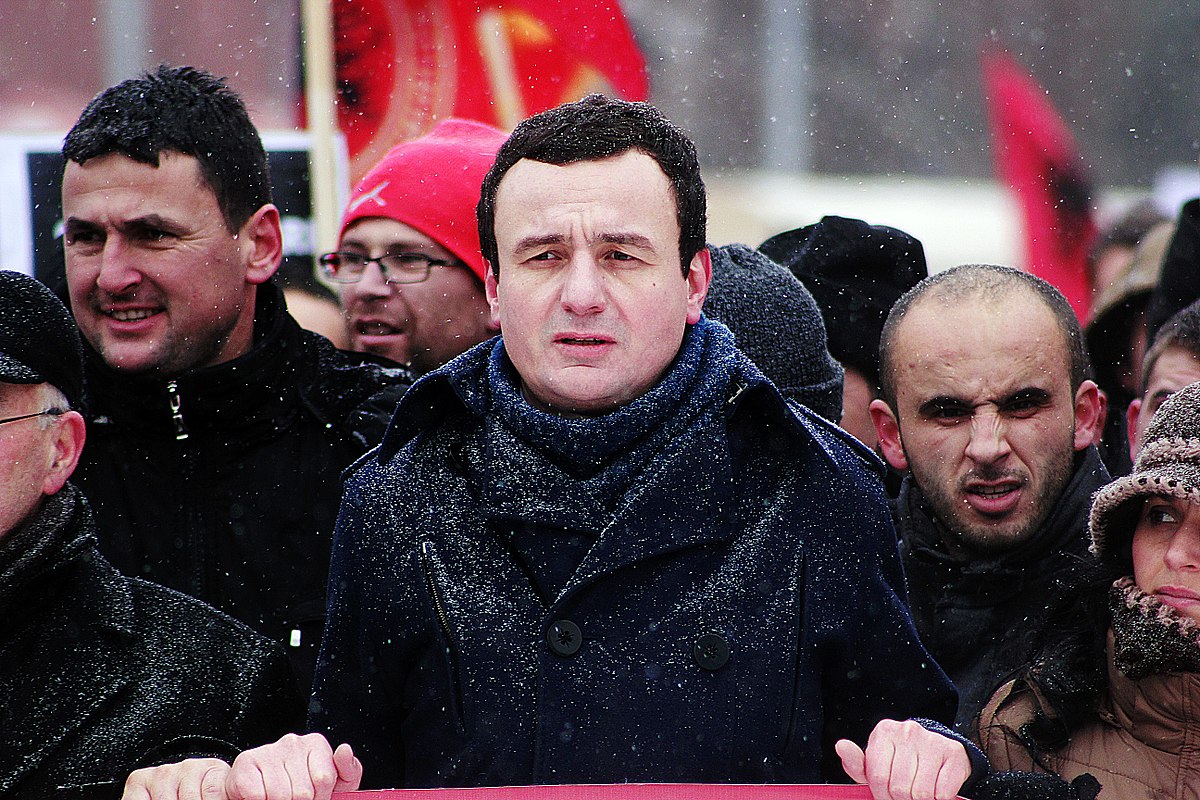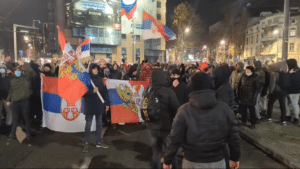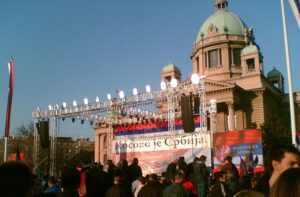The 2021 Kosovan parliamentary elections drastically reshuffle the balance of power in Kosovo’s parliament. The landslide victory of the Self-determination Movement (Vetëvendosje) is an electoral earthquake. The country’s governing parties have lost many of their seats at the expense of the Albin Kurti led party. The elections marked by snowfall and the COVID-19 pandemic did not occur without any irregularities. The overall process was fair with a record voter turnout of 47%. This historic win puts a lot of pressure on Albin Kurti’s Vetëvendosje movement to actually be the change that many Kosovans clearly desire. It will be interesting how a Vetëvendosje-led government will be formed, as the party recieved just shy of 50% percent of the votes.
Governing and established parties lose to Vetëvendosje
The Democratic League of Kosovo (LDK), a liberal-conservative centre (right) party, led by former Prime Minister Avdullah Hoti has lost most during this election. It was the largest party in the former government. The tables have drastically turned since the 2019 election, in which it gained the most seats out of all parties. The party’s vote share has decreased from 26% to 13%. Except for the Turkish Democratic Party of Kosovo (KDTP), the vote-shares of all other governing parties have decreased. These parties include the Albanian-nationalist Alliance for the Future of Kosovo (AAK), the Serbian-minority party Serb List (SL) and the Social Democratic Initiative (NISMA). The outcome suggest that Kosovans desire a change in government policy.
As mentioned, the biggest winner of the election is Vetëvendosje, a left-wing nationalist party, which is led by Albin Kurti. It already became the largest party in Kosovo during the 2019 elections, with a small margin ahead of the LDK. Kurti’s government was overthrown during the start of the COVID-19 pandemic, after which it became the largest opposition party. During this election the party has almost doubled its vote-share from 26% to 48%. In polls the party was already expected to become the big winner. However, it was uncertain how large its win would be.
The other large opposition party, the Democratic Party of Kosovo (PDK), has also lost a significant proportion of its votes. Its vote share decreased from 21% to 17%. After its party leader Kadri Veseli had to face war crime charges in The Hague, Enver Hoxhaj took over. He was not able to maintain Veseli’s position as “leader of the opposition”, which was already taken up by Kurti of Vetëvendosjein 2019. With this historic election win for Vetëvendosje, the party has installed itself as the dominant force in Kosovan politics.
Increasing voter turnout trend continues despite several irregularities
During the 2021 Kosovan parliamentary elections 47% of eligible voters cast their ballots. Although in absolute terms this might not be impressive, it is an increase since the 2017 and 2019 parliamentary elections, as in those elections voter-turnout was 41% and 45% respectfully. There seems to be an increasing trend. This despite the fact that polling stations were difficult to reach this election due to the snowfall, low temperatures and the ongoing measures against the spread of COVID-19. Remarkable was the fact that in the country’s northern-most counties voter-turnout was significantly higher, being as high as 85% in the county of Leposaviq, for instance. The SL became the biggest party in this Serbian-inhabited region of the country.
There have been reports coming in of citizens voting more than once in the region, which explain the remarkable high voter turnout in some counties. Local commissioners so far have denied such claims of double voting. The entire voting process did not occur without any irregularities. Large queues formed before the polling stations, in which citizens rarely respected the country’s Covid-19 social distancing measures. Several stations opened later than 07:00 AM, many voters with special needs were not able to vote, and often lacked the infrastructure to deal with conditional voting. Several incidents also occurred between commissioners from different parties, or with citizens themselves.
Implications of Vetëvendosje win
When addressing its supporters Albin Kurti, the leader of Vetëvendosje, stated that the “vote was unlike any other they have seen since the 1999 war with Serbia”. He claimed the election was “a referendum for justice and work, and against capture and corruption”. During the elections, the race for the new Prime Minister of Kosovo was also ongoing. Kurti of Vetëvendosje, Hoti of the LDK and Hoxhaj of the PDK were in the running to become the next Prime Minister of Kosovo. The election results put Kurti in pole position. Due to his time spent in prison, he is not allowed to become a member of parliament, but he can be appointed by his party as Prime Minister of Kosovo. After the election he has by far the strongest cards to become Kosovo’s Prime Minister in the near future.
Hoxhaj of the PDK already said that his party needs to accept the result of the election and congratulated his political rivals of Vetëvendosje. He stated that the PDK will not become part of an Vetëvendosje-led government and pledged to be constructive in opposition. Former Prime Minister Hoti of the LDK commented that he takes full responsibility for the election loss. Under his rule the party will also continue as an constructive opposition party, seeking to maintain its position as “a pro-Western orientated defender of democracy”. Both parties are expected to rebuild themselves and make necessary changes as opposition parties in the years to come.
The possible Vetëvendosje-led coalitions
This paves the way for Kurti and Vetëvendosjeto form a coalition with other minor parties and install a government. In polls, throughout January Vetëvendosjewas regularly expected to gain an absolute majority in parliament, but this has not happened in the end. It will be interesting to see what other parties might join an Vetëvendosje-led government. Vetëvendosje could become involved with minority parties, “turn left” and hope to work together with the social-democratic NISMA, or “turn right” and ally themselves with the nationalist AAK. An Vetëvendosje-led government is likely to break with “the old”, as that is what Kosovans seem to desire. Otherwise they would not have en-masse voted for Vetëvendosje, which pledged to fight corruption and campaigned with an anti-establishment rhetoric.
Sources: AA, Aljazeera, AP, BalkanInsight1, BalkanInsight2 CEC, DW, EE, Euronews, Ewb, Rferl1, Rferl2, Voa
Image: Wikimedia (Albin Kurti)



